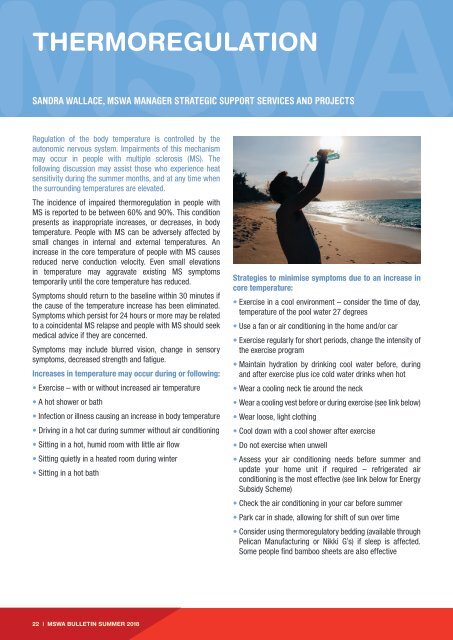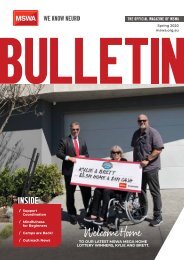Create successful ePaper yourself
Turn your PDF publications into a flip-book with our unique Google optimized e-Paper software.
THERMOREGULATION<br />
SANDRA WALLACE, <strong>MSWA</strong> MANAGER STRATEGIC SUPPORT SERVICES AND PROJECTS<br />
Regulation of the body temperature is controlled by the<br />
autonomic nervous system. Impairments of this mechanism<br />
may occur in people with multiple sclerosis (MS). The<br />
following discussion may assist those who experience heat<br />
sensitivity during the summer months, and at any time when<br />
the surrounding temperatures are elevated.<br />
The incidence of impaired thermoregulation in people with<br />
MS is reported to be between 60% and 90%. This condition<br />
presents as inappropriate increases, or decreases, in body<br />
temperature. People with MS can be adversely affected by<br />
small changes in internal and external temperatures. An<br />
increase in the core temperature of people with MS causes<br />
reduced nerve conduction velocity. Even small elevations<br />
in temperature may aggravate existing MS symptoms<br />
temporarily until the core temperature has reduced.<br />
Symptoms should return to the baseline within 30 minutes if<br />
the cause of the temperature increase has been eliminated.<br />
Symptoms which persist for 24 hours or more may be related<br />
to a coincidental MS relapse and people with MS should seek<br />
medical advice if they are concerned.<br />
Symptoms may include blurred vision, change in sensory<br />
symptoms, decreased strength and fatigue.<br />
Increases in temperature may occur during or following:<br />
• Exercise – with or without increased air temperature<br />
• A hot shower or bath<br />
• Infection or illness causing an increase in body temperature<br />
• Driving in a hot car during summer without air conditioning<br />
• Sitting in a hot, humid room with little air flow<br />
• Sitting quietly in a heated room during winter<br />
• Sitting in a hot bath<br />
Strategies to minimise symptoms due to an increase in<br />
core temperature:<br />
• Exercise in a cool environment – consider the time of day,<br />
temperature of the pool water 27 degrees<br />
• Use a fan or air conditioning in the home and/or car<br />
• Exercise regularly for short periods, change the intensity of<br />
the exercise program<br />
• Maintain hydration by drinking cool water before, during<br />
and after exercise plus ice cold water drinks when hot<br />
• Wear a cooling neck tie around the neck<br />
• Wear a cooling vest before or during exercise (see link below)<br />
• Wear loose, light clothing<br />
• Cool down with a cool shower after exercise<br />
• Do not exercise when unwell<br />
• Assess your air conditioning needs before summer and<br />
update your home unit if required – refrigerated air<br />
conditioning is the most effective (see link below for Energy<br />
Subsidy Scheme)<br />
Air Conditioning<br />
<strong>MSWA</strong> can assist Members on low incomes with funding<br />
towards the purchase of an air conditioner for their home,<br />
where they do not currently have one. This funding is made<br />
available through the generosity of a Lotterywest grant.<br />
Be aware, reverse cycle air conditioning is more effective<br />
than evaporative air conditioning.<br />
For further information about the grants, and<br />
eligibility, contact the <strong>MSWA</strong> Social Welfare Department<br />
on 9365 4835.<br />
The Thermoregulatory Subsidy<br />
To access the subsidy, the impact of heat must be significant,<br />
and the applicant must hold a pensioner concession card,<br />
health care card or health care interim voucher. This subsidy<br />
is $709/annum as at 1 September <strong>2018</strong> and is paid into<br />
your personal account through the Department of Treasury<br />
and Finance. It will contribute towards the costs associated<br />
with higher-than-normal power usage when running an air<br />
conditioner. Payment is made annually, and reapplication is<br />
required every two years. Your treating doctor must complete<br />
the forms.<br />
For further information and application forms please<br />
contact the Social Welfare department on 9365 4835 or<br />
they can be obtained online at:<br />
https://www.finance.wa.gov.au/cms/uploadedFiles/_State_<br />
Revenue/Other_Schemes/Thermoregulatory_Dysfunction_<br />
Application_Form.pdf<br />
Alternatively, you can phone the Energy Subsidies<br />
Enquiry Line on 9262 1373<br />
Cooling Garments<br />
Cooling garments are soaked with water and help to cool the<br />
body through the skin and blood circulation. They may be<br />
cooled in the refrigerator or simply kept moist for effective<br />
cooling. Some cooling vests have inserts that are put in the<br />
freezer to cool. Products include neck ties and vests. Further<br />
information is available from the <strong>MSWA</strong> Physiotherapy or<br />
Occupational Therapy staff on 9365 4888.<br />
Arctic Heat Cooling Vest Coolinit<br />
www.arcticheat.com.au www.coolinit.com.au<br />
Email admin@articheat.com.au Telephone: 9248 5355<br />
or Free call: 1800 88 00 67<br />
References:<br />
MS Practice 2009. For Health Professionals MS Australia June 2009<br />
M. Sylvester: Benefits and Strategies of Exercise Prescription for<br />
PwMS. MS Society of WA 2010<br />
• Check the air conditioning in your car before summer<br />
• Park car in shade, allowing for shift of sun over time<br />
• Consider using thermoregulatory bedding (available through<br />
Pelican Manufacturing or Nikki G’s) if sleep is affected.<br />
Some people find bamboo sheets are also effective<br />
22 | <strong>MSWA</strong> BULLETIN SUMMER <strong>2018</strong> <strong>MSWA</strong> BULLETIN SUMMER <strong>2018</strong> | 23


















